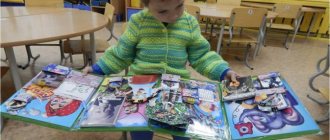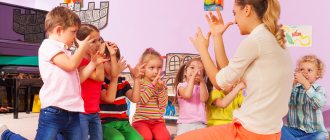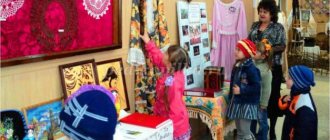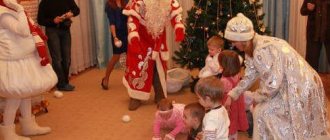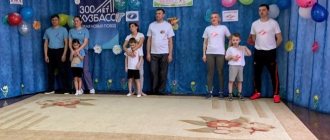Fairy tale in subject
Children know fairy tales well, but parents sometimes forget about fairy-tale characters and events. For this competition, the presenter must prepare in advance various objects by which a specific fairy tale can be recognized, for example, a turnip (“Turnip”), a red hat (“Little Red Riding Hood”), a can of canned peas (“The Princess and the Pea”), a calendar (“ 12 months"), any scarlet flower ("The Scarlet Flower"), a lollipop - a yellow cockerel on a stick ("The Tale of the Golden Cockerel") and so on. One by one, the presenter takes items out of the bag and shows them to the parents, and they must guess the fairy tale in this item. Whoever gives the most correct answers will be the winner.
Joint participation in the competition: junior kindergarten group
- Forfeits - the mother takes out a forfeit note, reads it, and the child completes the task that is written there.
- Mom and cartoon - mothers guess from which cartoon the fragment is shown (or photos of the characters are shown). Children can only guess the first letter.
- Fruit – mothers and children guess what kind of fruit is in the bag by tasting it by touch.
- Whoever has the most - the mother holds the hoop, and the child throws as many balloons into the hoop as possible.
- Dress the baby - mothers with their eyes closed try to dress the doll. Children should do the same.
What are we talking about?
In advance, the teacher or presenter asks the children the meaning of words (how they understand them), for example, what is love? What is money? What is a circus? And so on. Then the presenter processes the information and, as they say, inserts a word from each child into the designation of each word. For example, this is when they hug, dance and eat together, buy each other gifts; this is something that you cannot do without in life, they are used everywhere, in cinemas, on attractions, in stores, this is something that some give, while others take, and so on. The presenter reads out the wording of each of the “secret” words in turn, and the parents must guess what they are talking about. There is a prize for the parent for the correct answer.
Generalization of experience “Family competitions as part of the main educational program of a preschool educational institution”
I. V. Vasilevskaya,
MBDOU "Kindergarten No. 55 "Dolphin",
Republic of Adygea, Maykop, senior teacher
GENERALIZATION OF EXPERIENCE ON THE TOPIC “FAMILY COMPETITIONS AS PART OF THE MAIN EDUCATIONAL PROGRAM OF A PRESIDENTIAL EDUCATIONAL PROGRAM”
According to the Federal State Educational Standard, interaction between a preschool institution and the family is a mandatory part of the Basic Educational Program of a preschool educational institution.
In order to prevent the spread of the new coronavirus infection, we have to live and work in a new way. All participants in the educational process have been affected by these changes, and each of us must find opportunities to maintain the usual rhythm of life. It becomes important for the teaching staff to find new forms and methods of interaction between the preschool educational institution and the family, and to learn new communication between the teacher and the parent.
Family competitions have long become a good tradition in our kindergarten, and at the present stage of life, due to the threat of the spread of COVID-19, when parents of pupils do not have the opportunity to visit preschool educational institutions, to attend holiday matinees, this is practically the only form of work with the family. Family competitions are one of the ways to make the educational process of a preschool educational institution open, visible to parents, as well as a method for assessing the quality of education in a preschool educational institution by families of pupils.
The competition is not just an event within the preschool educational institution, it is a continuation and expansion of the educational process in which the child, parent and teacher participate. Teachers help the family prepare to participate in the competition; the child gets his first social experience of participating in a competitive movement, and the parent learns to take competitions seriously, becoming familiar with the regulations and evaluation system.
Thus, through the competitive movement in the preschool educational institution, the teaching staff solves for itself the important task of continuity in the upbringing of the child in the family and kindergarten. We try to select the types and topics of competitions so that every parent can find something interesting and exciting for themselves and their child. When choosing and planning competitions and their topics, we take into account the needs and capabilities of different families, as well as the methodological tasks of the teaching staff for the school year.
The most beloved and long-standing competition is the child-parent competition of the New Year's toy “Gift for the main Christmas tree of the kindergarten.” We want the kindergarten to be decorated by the hands of not only the children, but also their parents, so that in families, like in the good old days, the holiday atmosphere comes to the house long before New Year's Eve. This parent-child competition is held to attract attention to environmental activities; formation of an ecological worldview; development of aesthetic taste and practical skills in making New Year's toys.
The competitions were especially popular: “Dad Can” - creating military equipment from waste material for Defender of the Fatherland Day; “Autumn Bouquet” - designer bouquets and ikebana from plants growing in the territory of the small Motherland for the Day of the Republic of Adygea; “Eco-fashion” - creating a new image for your favorite doll from recycled materials as part of the additional educational program “A Clean City Starts with Me”; “Grow a flower at home” - replenishing corners of nature with indoor plants grown by children under the guidance of their parents; a child-parent reading competition for the 75th anniversary of the Great Victory “We talk about the war in poetry...”, a patriotic drawing competition “The Russian flag flies proudly.”
Organizing and holding parent-child competitions activates and brings parents closer to the kindergarten. The purpose of organizing a competitive movement in a preschool educational institution is to expand the social and educational space for the child and parents, create conditions for acquiring social experience in the competitive movement and form a pedagogical culture among parents to prepare and support their child.
Competitions for children and their families are inherently an educational project. Particular attention is required to the development of competition regulations - documents that guide all competition participants. The regulations must contain the conditions for conducting and evaluation of the competition (evaluation criteria, jury composition).
The competition regulations are posted on the official website of the preschool educational institution in advance. The task for teachers in preparing for the competition is to draw up consultations for parents. For example, in preparation for the recitation competition for the 75th anniversary of the Great Victory “We talk about war in poetry...” consultations “Learning Poems” were prepared, and parents were assisted in selecting poems for each child according to their interests, abilities and age characteristics.
But most importantly, it is necessary to carefully consider the procedure for evaluating and rewarding competition participants. The assessment procedure should not be reduced to formalism. Participants must understand the responsibility and seriousness of the moment, remember that defeats and failures are part of the socialization and psychological maturation of the child. There are always winners in competitions, but the best assessment is the joy of the children. Of course, we must try to soften the procedure, offer different nominations for competitions so that there are more winners. Presentation of works: photo reports, videos and results of the competition are posted on the official website of the preschool educational institution.
Literature:
1. Mikhailova-Svirskaya L.V. Working with parents. - M.: Education, 2015. - 126 p.
2. Family Sunday pass. Joint activities of teachers, parents, children / author-comp. N.V. Dodokina. – Volgograd: Teacher. – 159 p.
Collecting the cubes is not easy
Parents are divided into several teams with the same number of participants. Each team receives the same number of dice corresponding to the number of participants. Team members stand one after another and, starting with the first participant, do the following: the participant throws the dice with one rolling throw, and the second participant must roll the dice with the same one throw as close as possible to the first participant’s dice. Then the third participant makes the throw, the fourth and so on. The team with the most friendly pile of cubes will be the winner.
Bird houses
An outdoor game in which children of all ages can take part. You need to invite 4 pairs who will form bird houses (holding hands, raising them up, depicting the roof of the house). There are houses, now children are invited to play the role of birds. There should be more of them than houses. With music playing quietly in the background, the presenter says: “Birds are flying... flying,” the children move around the room. As soon as the leader says: “The rain has started,” the children must run to the house, standing under its roof, that is, under the raised hands of other children. Those who do not have enough space are eliminated. The fewer birds left, the fewer houses left. The game is played according to the principle of the classic game “Take a Chair”.
Pass the candy
Parents are divided into teams with the same number of participants (approximately 7-10 people each). Team members are seated in separate rows. In front of the first participants are bags of candy (in quantities equal to the number of team members). At the “start” command, the first participant takes one candy and passes it through the other participants (from one to another) to the last. As soon as the last participant picks up the candy, he loudly shouts “mine.” Then the first participant takes the candy again and passes it through the participants to the second to last one. So the game continues until the first participant takes the last candy and it is his. The team that completes the task faster than the other teams will be the winner.
Children parents joint competitions: senior group of kindergarten
- Festive dinner - the child must feed the mother a banana using a teaspoon. The mother's hands are on her knees; she should not help the child.
- Scene - a mini-scene is handed out on cards that needs to be shown. For example, “My daughter is sick,” “Mom is trying to feed the child porridge, which she doesn’t like,” etc. The main condition is that children and parents change places in the skit, the child takes on the role of an adult, and the adults become children.
- Help me get my mom ready - mom on the chair, hands on her knees. Nearby on the table are beads, a hat, a comb, keys, a bag, and a toy phone. Mom needs to get ready for work: brush her hair, put on beads and a hat, put her keys and phone in her bag.
- Beads - the child, together with his mother, needs to string the pasta onto a thread within a certain time.
- Golden hands - mothers should make an outfit for the child from a scarf, bows and a scarf. A dressed child walks like a model, showing off his outfit.
Road games
Print out several pictures of real traffic signs and have children guess what each one means. As always, start with simple signs - a pedestrian crossing, a speed limit sign or a railway crossing. Gradually increase the difficulty - ask children to guess what the inverted triangle sign or crossed out horn means.
Musical charade
Print out cards with images of different musical instruments - piano, guitar, saxophone, harp, drums, violin, flute and so on. Place the cards in a bag and ask the children to take turns pulling out a picture and pretending to play a musical instrument. Other children, parents and teachers must guess the instrument. You can’t suggest with words, but you can and should depict sounds
I believe - I don't believe
Prepare 10-15 interesting facts and ask the children to guess which ones are true and which ones are not. Start with a simple one - “the earth is round” and gradually complicate the task by adding unusual facts. For example, “snow has never fallen in the Sahara Desert” (not true) or “a camel’s spine is curved in the shape of a hump” (not true). You can make the game more interesting if you accompany each fact with a picture that confirms or refutes it.

